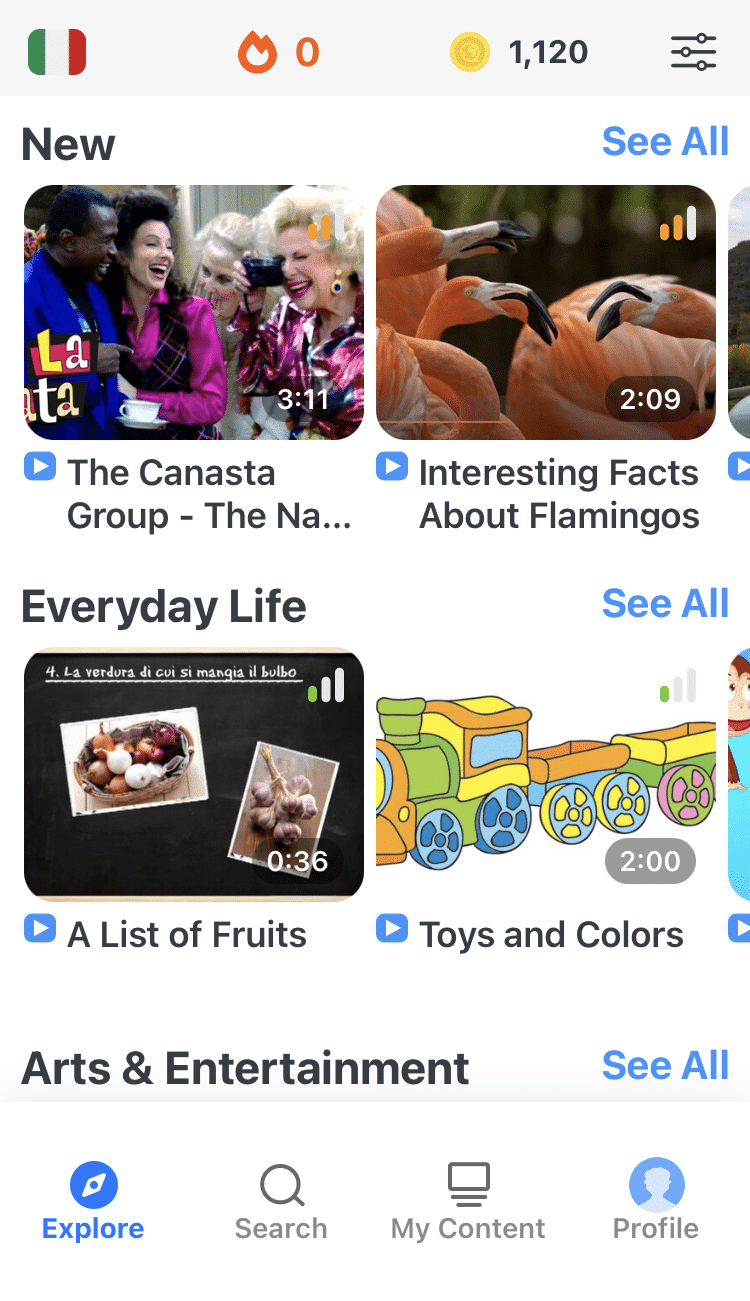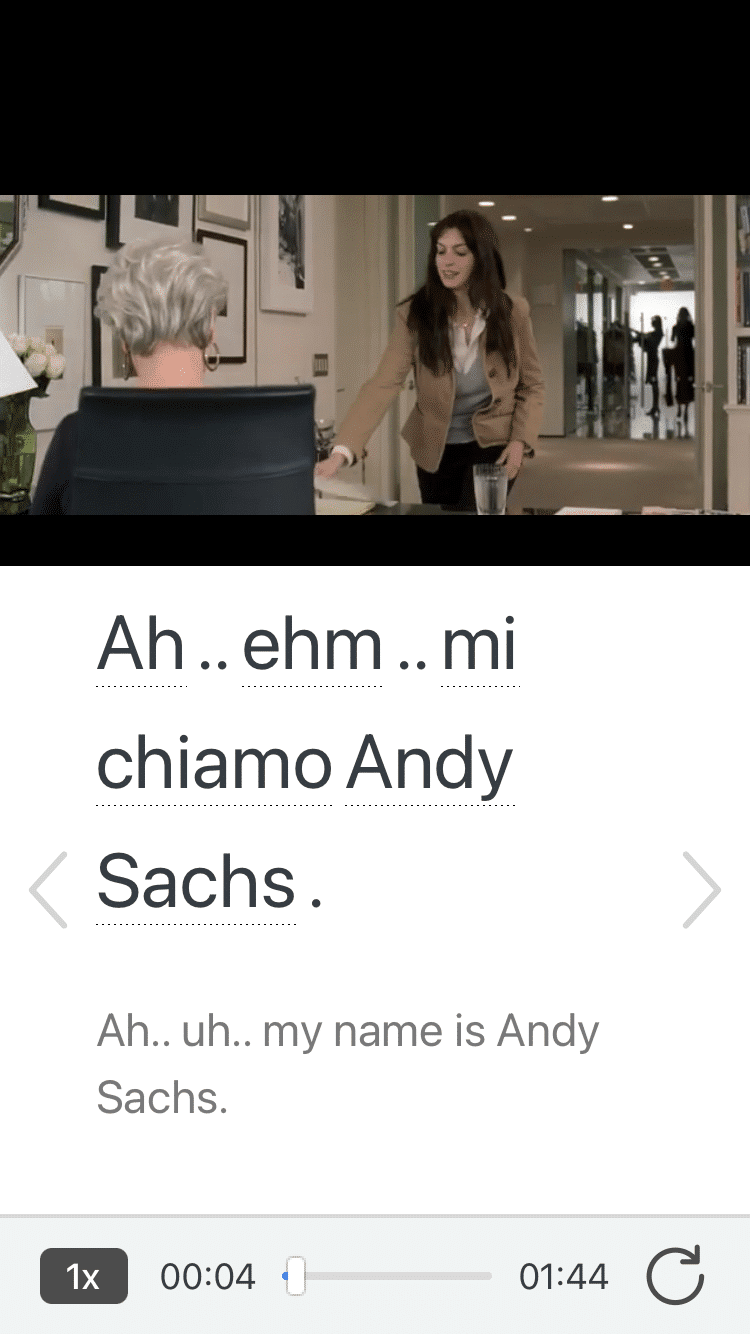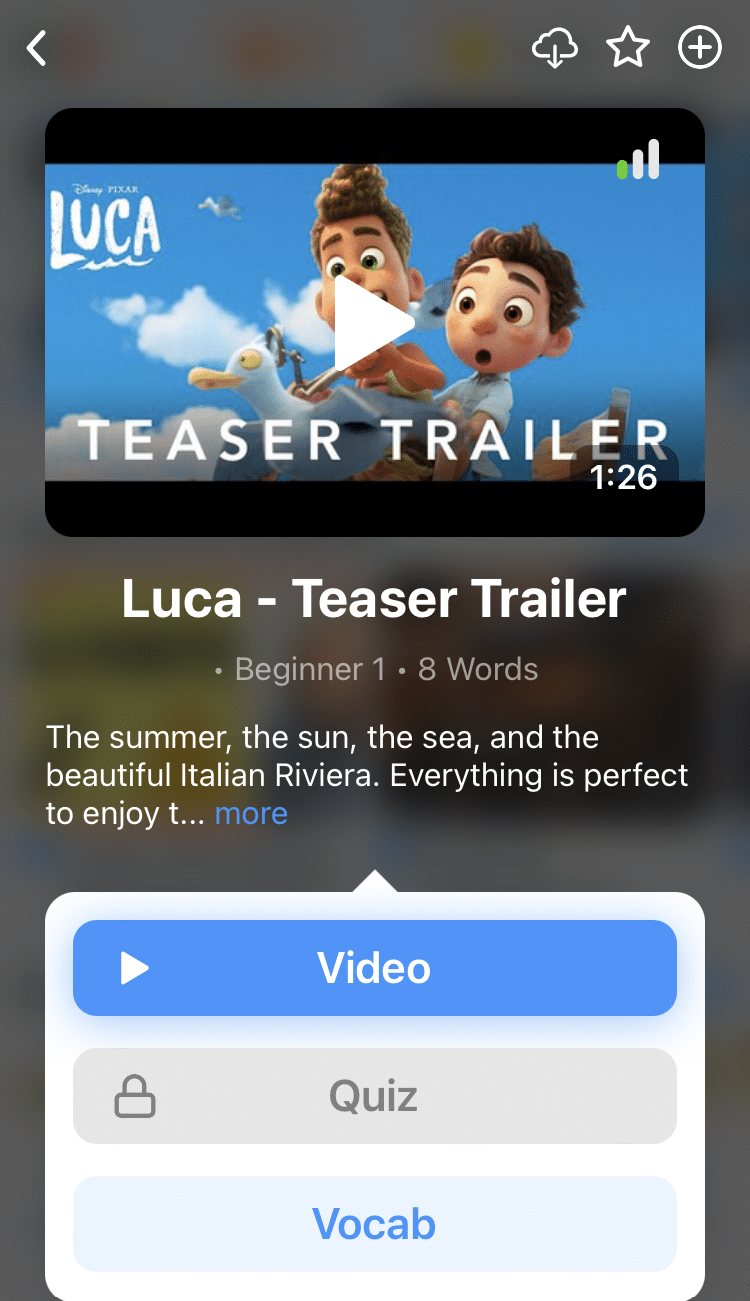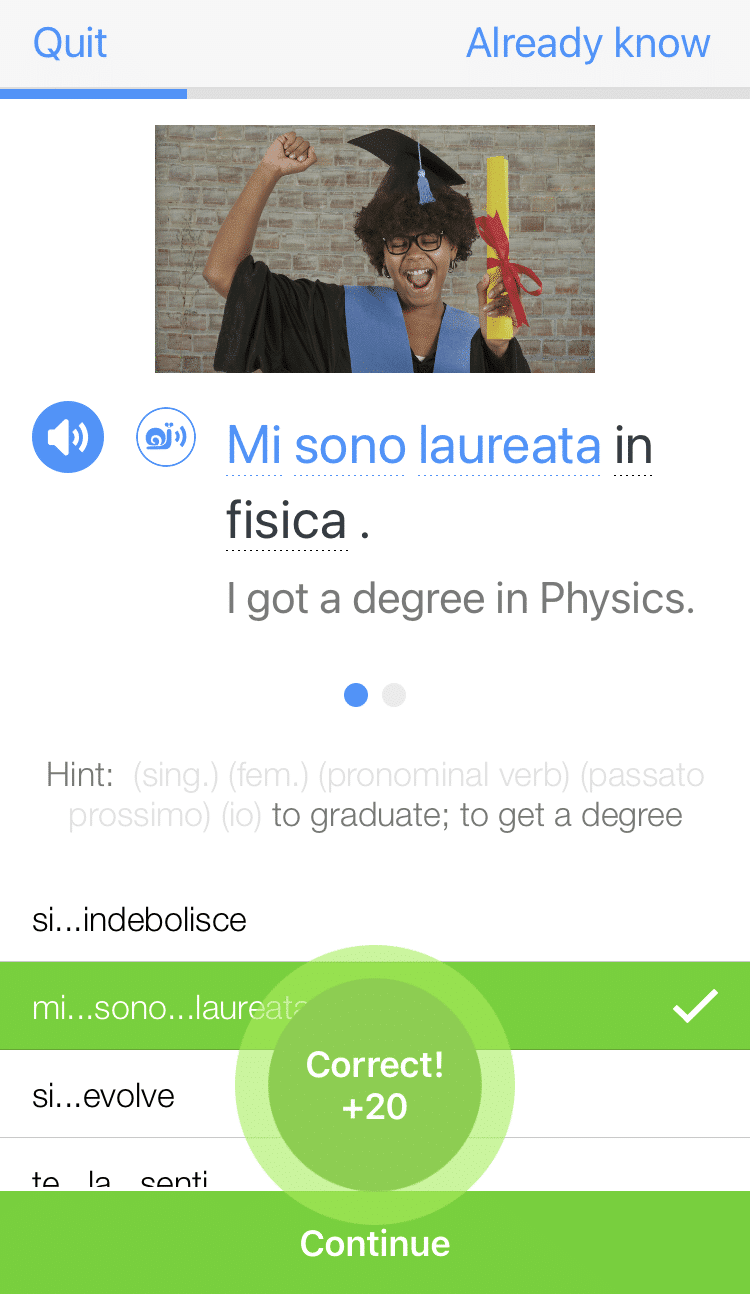
30 Italian Exclamations
You’ve probably seen the gestures that are such an essential part of communicating in Italian. A flick of the wrist or the swing of a palm from a native Italian can inspire joy, laughter or dread (believe me, I had an Italian girlfriend).
But these gestures are just the beginning.
Exclamations are what bring color to the Italian language. They bring emotion to a conversation and add weight to your words.
Let’s take a look at some of the most common Italian exclamations because, without them, you’ll seem like a boring old stranieri (foreigner).
Contents
- 1. Macché! (Of course not/Certainly not/Not at all/Not a chance/No way!)
- 2. Ma dai! (Really?!)
- 3. Dai! (Come on!)
- 4. Vai! (Go!)
- 5. Bravo! (Great job!)
- 6. Guai! (You’ll get in trouble/Don’t even try!)
- 7. Forza! (You can do it!)
- 8. Accidenti! (Damn!)
- 9. Mannaggia! (Darn!)
- 10. Zitto! (Shut up!)
- 11. Eccolo! (Here he/she/it is!)
- 12. Silenzio! (Be quiet!)
- 13. Uffa! (Expresses annoyance/boredom)
- 14. Ahia! (Ouch!)
- 15. Boh! (I dunno!)
- 16. Puah! (Eww!)
- 17. Oh! (Hey!)
- 18. Ehi! (Hey!)
- 19. Aspetta! (Wait!)
- 20. Ascolta! (Listen!)
- 21. Guarda! (Look out!)
- 22. Smettila! (Stop!)
- 23. Mamma mia! (Wow!/My goodness!/Oh my gosh!)
- 24. Magari! (I wish!)
- 25. Figo! (Cool!/Awesome!)
- 26. Ma va’! (No way!/Come on!)
- 27. Salute! (Cheers!)
- 28. Sei fuori! (You’re crazy!)
- 29. Figuriamoci! (No surprise!/Imagine that!)
- 30. Che + Adjective/Noun
- And One More Thing...
Download: This blog post is available as a convenient and portable PDF that you can take anywhere. Click here to get a copy. (Download)
1. Macché! (Of course not/Certainly not/Not at all/Not a chance/No way!)
As you can see, there are many ways you can use macché.
A: Sarai stanco! (You must be tired!)
B: Macché! Sto benissimo. (Not at all! I’m perfectly fine.)
2. Ma dai! (Really?!)
This is something you say when you hear something that makes you say “Really?!,” “No way!” or “You’re kidding!”
A: Ho appena vinto un milione di euro alla lotteria! (I just won a million euros in the lottery!)
B: Ma dai! (No way!)
3. Dai! (Come on!)
This one can be used like macché or when you mean “Come on!” “Let’s go!” or “Hurry up!” It’s pretty versatile, but usually expresses some urgency or disappointment.
A: Non puoi venire con noi! Sei troppo piccolo! (You can’t come with us! You’re too little!)
B: Dai ma voglio venire! (Come on! I want to go too!)
4. Vai! (Go!)
This exclamation is one you’d commonly hear at una partita di calcio (a football match).
Vai! Vai! GOL! (Go! Go! GOAL!)
It can also be used to mean “Go away!” but it’s quite rude.
5. Bravo! (Great job!)
This one should need no explanation. When someone does something well, you say Bravo!
When it’s a girl who’s done something well, you need to say Brava!
A: Ho appena finito di scrivere il mio romanzo. (I’ve just finished writing my novel.)
B: Bravo! (Well done!)
6. Guai! (You’ll get in trouble/Don’t even try!)
This exclamation is often used in phrases like guai a te (don’t even try) or guai a voi (you’ll get in trouble), both of which warn someone that they’re about to be in a load of hot water.
A: Mangio uno di questi biscotti. (I’ll eat one of these cookies.)
B: Guai a te! (Don’t even try!)
7. Forza! (You can do it!)
You might hear this one at a sports match as well, or use it to encourage a friend playing an intense game of Mario Kart.
A: Non riesco a superare l’esame! (I can’t pass the exam!)
B: Forza! Studiamo insieme! (You can do it! Let’s study together!)
8. Accidenti! (Damn!)
This is a tame way to express your discontent about one thing or another. If you just missed the bus, you might let out an “Accidenti!” under your breath.
Accidenti! Il mio computer si è bloccato proprio mentre stavo per finire il mio rapporto! (Damn! My computer crashed just as I was about to finish my report!)
9. Mannaggia! (Darn!)
Mannaggia is the Italian equivalent of “darn” in English—i.e., a tamer version of “damn” that conveys a milder sense of frustration, annoyance or disappointment.
A: Ho dimenticato di comprare il pane per la cena. (I forgot to buy the bread for dinner.)
B: Mannaggia! Ora dobbiamo fare un altro viaggio al supermercato. (Darn! Now we have to make another trip to the supermarket.)
10. Zitto! (Shut up!)
Not very polite, but super fun to say, this is a common exclamation among Italian teenagers.
Just as with bravo, the form you use depends on the gender and number of the people you’re referring to.
A: So con chi sei stata ieri sera. (I know who you were with last night.)
B: Zitta! (Shut up!)
11. Eccolo! (Here he/she/it is!)
You use this exclamation when you find something that you’d been looking for. It also works when someone you’ve been waiting for turns up late.
A: Non possiamo partire senza Antonio. Dov’è? (We can’t leave without Antonio. Where is he?)
B: Eccolo! OK, andiamo! (Here he is! OK, let’s go!)
12. Silenzio! (Be quiet!)
This zesty exclamation is often needed in the boisterous boot we call Italy.
A: Scusa, ho una notizia importante da condividere. (Excuse me, I have important news to share.)
B: Silenzio! Sta parlando il professore. (Silence! The professor is speaking.)
13. Uffa! (Expresses annoyance/boredom)
You might use this exclamation if you significant other is telling you for the 1000th time that if you went to the gym more often, you’d have more energy.
Use it with this hand gesture for the full effect.
Uffa, ho perso il mio portafoglio di nuovo! (Ugh, I’ve lost my wallet again!)
14. Ahia! (Ouch!)
Pronounced like the classic karate chop sound (“Hi-Ya!”) but without the “H” sound, this is simply the way an Italian lets you know you just stepped on their toe.
Ahia! Ho picchiato il dito mentre chiudevo la porta! (Ouch! I hit my finger while closing the door!)
15. Boh! (I dunno!)
In any situation where you’re pretty much clueless about the answer to a question or problem, you can let out a deep boh!
A: Sai dove ho messo le chiavi di casa? (Do you know where I put the house keys?)
B: Boh! (Beats me!)
16. Puah! (Eww!)
This exclamation is pronounced the same as our word, “poo,” which is fitting because it’s the expression used when you see (or smell) something gross.
Questa minestra ha un sapore strano, puah! (This soup has a strange taste, eww!)
17. Oh! (Hey!)
If you need to get the attention of someone close to you (like a family or friend) in Italy, you’ve got to do it their way. Oh is a fun one because you can draw it out. A nice long oohhhh will make you feel like a genuine wise guy. Play with the tone and make it your own!
But you may not want to use this with complete strangers, as it will sound rude.
Oh, scusa! Posso chiederti una cosa? (Oh, excuse me! Can I ask you something?)
18. Ehi! (Hey!)
Ehi sounds similar to the English “hey,” but without the “H” sound. You use it the same way you use “oh.”
Ehi, hai sentito le ultime notizie? (Hey, have you heard the latest news?)
19. Aspetta! (Wait!)
Aspetta is often used as an imperative in Italy. There are three ways to form the imperative in Italian: (1) for verbs ending in -are, add “a” to the root of (making it essentially the same as third person present tense); (2) for other verbs, use second person singular and plural; and (3) for the formal “you,” the subjunctive is used for all verbs.
Similar to English, the imperative can sound offensive in Italian.
A: Sto andando al cinema adesso. (I’m going to the movies now.)
B: Aspetta! Vengo anch’io. (Wait! I’m coming too.)
20. Ascolta! (Listen!)
You can use this when you mean “Listen here!” or “Listen up!”
Ascolta! Ho una novità da dirti. (Listen! I have some news to tell you.)
21. Guarda! (Look out!)
Use guarda for when you want to warn someone of an incoming danger.
Guarda, c’è una macchina che sta arrivando! (Look out, there’s a car coming!)
22. Smettila! (Stop!)
This verb in the imperative commonly has the particle “la” attached to it. It can also mean something like “Cut it out!”
Smettila! Non posso credere a quanto sei irritante. (Cut it out! I can’t believe how annoying you are.)
23. Mamma mia! (Wow!/My goodness!/Oh my gosh!)
You’ve probably heard Mamma mia! a million times on Italian TV shows and movies—and that’s not counting the Meryl Streep films of the same name. It’s one of those versatile exclamations that can convey everything from surprise (pleasant or otherwise) to frustration.
A: Ho vinto i biglietti per il concerto di Coldplay! (I won tickets to the Coldplay concert!)
B: Mamma mia! Davvero? (Wow! Really?)
24. Magari! (I wish!)
When you want to express that it would be really, really great if something happened the way you wanted it to, use magari.
A: Stai frequentando qualcuno al momento? (Are you dating anyone right now?)
B: Magari! (I wish!)
25. Figo! (Cool!/Awesome!)
You’ll often hear this one among younger Italians who want to express amazement (in a good way) at something or someone.
A: Ho appena comprato un’auto nuova. (I just bought a new car.)
B: Figo! Che modello hai preso? (Cool! What model did you get?)
26. Ma va’! (No way!/Come on!)
On the other hand, if you want to express that you don’t completely buy into what someone said, you use this one.
A: Ho deciso di smettere di mangiare dolci. (I’ve decided to stop eating sweets.)
B: Ma va’! Ma tu sei il più grande amante del cioccolato che io conosca! (No way! But you’re the biggest chocoholic I know!)
27. Salute! (Cheers!)
Similar to the English “cheers!,” salute is used when you want to wish someone good luck or fortune.
A: Alla tua nuova avventura! (To your new adventure!)
B: Salute! (Cheers!)
28. Sei fuori! (You’re crazy!)
The literal translation of sei fuori is “you’re out”—by which Italians mean “you’re out of your [expletive] mind.”
A: Posso scalare l’Everest in un giorno. (I can climb Everest in one day.)
B: Tu sei fuori! (You’re out of your mind!)
29. Figuriamoci! (No surprise!/Imagine that!)
Figuriamoci, like many of the other exclamations we’ve already talked about, is pretty fun to use. It can be a straight or sarcastic way to express that something happened exactly the way you expected it to.
A: Ho fallito l’esame ieri! (I failed the exam yesterday!)
B: Figuriamoci! Hai passato la notte prima a fare festa! (No surprise! You spent the night before partying!)
30. Che + Adjective/Noun
The most common type of Italian exclamation is the “che + adjective” exclamation. To form this exclamation, you simply say che (it usually translates to “how” in this context) and add an adjective.
For example:
- You see a handsome dude and say, Che bello! (How handsome!). If “he” is a “she,” you say Che bella! (How beautiful!). And when you see a nice dress in a shop window, you also say Che bello! (How nice!)
- Your friend tells you about the spaghetti alla carbonara she prepared and you say, Che buono! (How good/delicious!).
- Your friend (a different one) splurged on tickets to see an international pop superstar only to find out that the concert was cancelled, so they say Il concerto è stato annullatto! (The concert was cancelled!) You can respond with Che brutta notizia! (What terrible news!)
You can also use che with nouns like in Che peccato! (What a pity!)
Italians use exclamations all the time. It’s not just an important part of their language, it’s one of their favorite things to do! Whether they’re at a match, in a bar or just starting out the window, there’s always something to exclaim about.
If you want to be part of the culture, you need to join in on the conversation. So give your Italian an extra life by using these expressions in your conversations.
Even if your Italian isn’t great, you can still learn Italian exclamations and join the gossip circle. Use them for fun or as a lifeline.
Either way, if you can let out enough “macchés” and “Uffas,” you’re sure to gain a seat at the table and a full glass of wine at any local Italian bar.
Download: This blog post is available as a convenient and portable PDF that you can take anywhere. Click here to get a copy. (Download)
And One More Thing...
If you're as busy as most of us, you don't always have time for lengthy language lessons. The solution? FluentU!
Learn Italian with funny commericals, documentary excerpts and web series, as you can see here:

FluentU helps you get comfortable with everyday Italian by combining all the benefits of complete immersion and native-level conversations with interactive subtitles. Tap on any word to instantly see an image, in-context definition, example sentences and other videos in which the word is used.

Access a complete interactive transcript of every video under the Dialogue tab, and review words and phrases with convenient audio clips under Vocab.

Once you've watched a video, you can use FluentU's quizzes to actively practice all the vocabulary in that video. Swipe left or right to see more examples of the word you’re on.

FluentU will even keep track of all the Italian words you’re learning, and give you extra practice with difficult words. Plus, it'll tell you exactly when it's time for review. Now that's a 100% personalized experience!
The best part? You can try FluentU for free with a trial.
Start using the FluentU website on your computer or tablet or, better yet, download the FluentU app from the iTunes or Google Play store. Click here to take advantage of our current sale! (Expires at the end of this month.)


